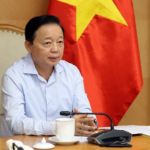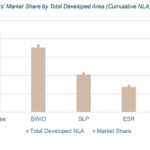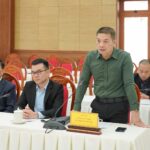This resolution outlines the pilot implementation of offering, issuing cryptocurrency assets, organizing cryptocurrency asset trading markets, and providing cryptocurrency asset services, along with state management of the cryptocurrency asset market in Vietnam.
This announcement is particularly noteworthy, as Vietnam currently ranks among the top countries globally in terms of digital asset ownership and trading (approximately 17 million people, with $1 trillion USD in transactions in 2024). Vietnam is also among the top 5 countries in terms of interest in digital assets and top 3 in the use of international platforms.
According to a recent report by VinaCapital, up to 17 million Vietnamese have participated in cryptocurrency transactions, with an estimated annual transaction value of over $100 billion USD. Thus, Resolution No. 05 not only helps Vietnam transition cryptocurrency activities from a large-scale informal market but also protects consumers.
We had a discussion with Mr. Charles Hoskinson, an expert with over 10 years of experience in Web3 and Blockchain, about the development of this trend globally and in Vietnam.

Vietnam is becoming very open in terms of legal frameworks for the digital asset market, and many businesses are registering to participate. Do you think there will be a boom in Vietnam when the official cryptocurrency platform launches?
Mr. Charles Hoskinson: Vietnam has been undergoing many dynamic changes. In the cryptocurrency market, there are two main segments: consumption and production.
In the consumption segment, Vietnam is already strong. Evidence shows that 21% of the population owns digital assets, totaling $222 billion USD, with half held overseas (crypto). The government’s new policy aims to bring this back to the Vietnamese market. Thus, with the new regulations, it is expected that over $100 billion USD in cryptocurrency transactions will return to Vietnam.
In the production segment, I observe that Vietnam still lacks many products. To address this, I believe Vietnam needs to enhance workforce training and encourage blockchain entrepreneurship.
Vietnam also has many untapped real assets such as real estate, natural resources, and its long coastline. If these assets are tokenized, Vietnam could create a new “playground” worth trillions of dollars, while developing a sustainable digital economy.
There are many reports indicating that Vietnamese are among the top global investors in cryptocurrency. What is your opinion on this?
Mr. Charles Hoskinson: It’s true that the amount of cryptocurrency held by Vietnamese is high, at $222 billion USD, exceeding the current GDP. Vietnam is among the top 10 countries in cryptocurrency investment, with a remarkably fast growth rate.
There are several reasons for this trend. First, the high level of internet access and widespread 5G Wi-Fi connectivity. I consider Vietnam’s digital economy to be quite dynamic compared to other countries.
Additionally, Vietnamese have high access to financial markets and a strong adaptability to new financial assets.
Moreover, the skilled IT workforce is adept and open to cryptocurrency.
Vietnamese are very passionate. Looking at the startup wave, although the companies are small, their development speed is fast, often launching new products within 3–6 weeks – a rarity in Japan or South Korea. Therefore, this market is ideal for testing new products.
What will Vietnam’s digital economy look like amidst the explosion of digital platforms, AI, and Blockchain?
Mr. Charles Hoskinson: Beyond cryptocurrency, Vietnam is renowned for game development, programming, and even producing many Japanese animated films.
Simultaneously, the digital economy and information technology are growing strongly, alongside initiatives to train AI and blockchain talent.
With Blockchain technology, the core is trust. Blockchain is built on blockchain data, where all information is timestamped, making it immutable and transparent.
Therefore, Blockchain will make the world more equitable. And with trust, business transactions will be faster and more efficient.
However, Blockchain is still “like a toddler learning to walk, it will stumble but will grow up.”

Based on your experience in various markets, do you have any recommendations for the upcoming cryptocurrency asset market in Vietnam?
Mr. Charles Hoskinson: I believe that when establishing rules, there are two approaches: the “carrot” or the “stick.”
The “carrot” approach rewards compliance. For example, investors trading cryptocurrency in the Vietnamese market are protected, whereas those trading abroad cannot be protected.
The “stick” approach involves penalties for non-compliance.
For a dynamic market like Vietnam, I think the “carrot” model should be applied, as voluntary compliance is more effective.
Globally, each country has a different approach. For instance, Europe has made significant progress with the MiCA (Markets in Crypto-Assets) regulation, laying the foundation for a transparent and secure digital asset market. Dubai and Singapore have also adopted an open approach, attracting blockchain businesses and creating a global competitive environment.
The common trend is to balance innovation with risk management. No country wants to fall behind in the technological race, but neither do they want to face risks from money laundering, fraud, or financial control loss.
Ho Chi Minh City: Vietnam’s Megacity and Engine of Growth
In just a few days, the Ho Chi Minh City Party Congress will officially commence. This event transcends local politics, marking a pivotal moment in the nation’s development. As the first Congress following the city’s expansion through the merger with Binh Duong and Ba Ria – Vung Tau, it heralds the birth of a megacity boasting over 14 million residents. This new metropolis stands as Vietnam’s premier hub for industry, services, finance, and maritime trade.
Mapletree’s Vision: Leading Vietnam’s Pre-Built Warehouse Rental Market (Part 2)
After 20 years in Vietnam, Mapletree has solidified its leadership in the ready-built warehouse (RBW) sector, commanding over 26% market share. Amid the “China+1” trend driving robust FDI inflows, the Group aims to set new benchmarks for Vietnam’s logistics industry.



















